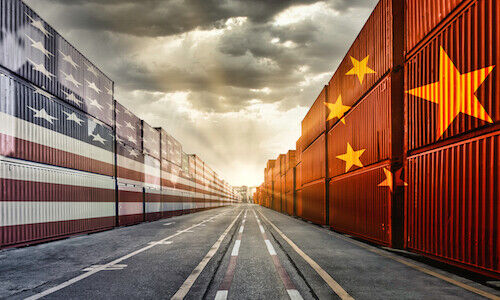UBS AIC: Speakers Sound-Off on Trade War Economy
The ongoing trade war and tariffs expectedly dominated discussions at UBS’ 28th Asian Investment Conference. Speakers shared their views on the outlook for 2025 and beyond.
In mid-May, the US and China managed to ink a trade deal a little over a month after «Liberation Day» with an agreement to reduce tariffs for 90 days. A US-UK trade deal was also secured this month and there are reportedly other deals in the works. What does this mean for the global economy? According to speakers at the 28th UBS Asian Investment Conference, trade war worries may have been overplayed.
«In the end, the tariff wars may prove to be more limited than the initial US moves. The short run impacts may be smaller than feared,» said Olivier Blanchard, former International Monetary Fund (IMF) chief economist, and current professor emeritus of economics at MIT. «But it will change the world economy and the role of the US in fundamental ways.»
«What matters, though, in figuring out where [tariffs] settle is what kind of new world order the US administration has in mind, and what it will be allowed to implement,» added Raghuram Rajan, the 23rd governor of the Reserve Bank of India and also an ex-IMF chief economist.
Rules-Based International Order
Beyond the near term, there are also questions about the state of global trade and the future of the rules-based international order. Will this order be maintained and will institutions that have played a supporting role, such as the World Trade Organization (WTO), continue to be relevant?
«The world trading system is not about might, but about right. Trade is like water, it always finds a way. In an era marked by unpredictability, trade policies that foster uncertainty risk undermining global economic stability and investor confidence,» commented Pascal Lamy, former head WTO, European commissioner for trade.
«The WTO faces serious challenges today, caught between protectionism and unilateralism. Yet, despite its difficulties, it remains essential – better than a world ruled by the law of the strongest.»
Trade Peace Not Guaranteed
However, continuity of the existing trading system is not a sure thing. According to Dmitry Grozoubinski, an international trade policy expert and author of «Why Politicians Lie About Trade», the US retreat is not due to the change in its perspective on trade wars or tariffs as a policy tool but because it «deployed them so hastily, thoughtlessly and sweepingly that it found itself outmaneuvered and unprepared».
«[A]ny reimagining of the international trading system has to reckon with the fact that countries will want to walk these roads again, and may not be thwarted in doing so even by treaty level commitments,» said Grozoubinski. «Unfortunately, triage, transparency, mitigation and de-escalation are more realistic goals for a reimagined trading system than serving as a guarantor of lasting trade peace.»



























